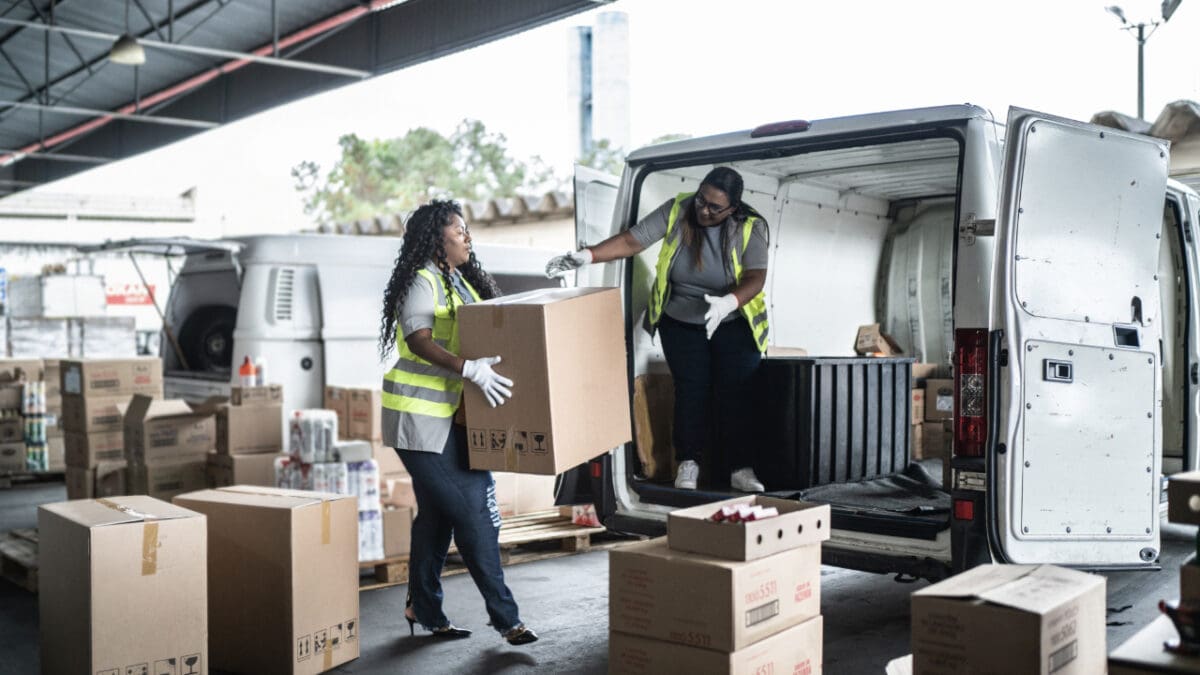
If you work in the evolving world of logistics and shipping, you know that making the right call between carriers vs couriers can have a big impact on your operations. It’s a decision that helps balance factors like cost and delivery time, making it an important aspect for delivery and operations managers to consider. Having a clear understanding of both options can help you make informed choices that suit your specific shipping needs.
Today, we’re taking a deep dive into the distinct roles, unique benefits, and key differences between carriers vs couriers. Whether you’re shipping small, urgent packages or large, international cargo, understanding these nuances is vital for optimizing your logistics strategy and ensuring successful deliveries.
Understanding Carriers
In the shipping industry, carriers are organizations or individuals that transport goods from one location to another. They are the backbone of global trade, ensuring the movement of goods across vast distances. Carriers can be categorized based on their transportation mode: air, sea, rail, and road. Each type of carrier specializes in different aspects of shipping:
- Air carriers offer speed and are ideal for time-sensitive shipments.
- Sea carriers handle large volumes, suitable for bulk and heavy cargo.
- Rail carriers provide a balance of speed and capacity, often used for intercontinental shipping.
- Road carriers offer flexibility and are essential for last-mile deliveries.
Choosing a carrier for your shipping needs provides many benefits that cater to various logistical requirements:
- Extensive Reach: Carriers aren’t just limited to major global destinations. They also connect remote and less accessible regions, ensuring a truly comprehensive coverage. This extensive reach is facilitated by their partnerships with local and regional carriers, enhancing their network even further.
- Scalability: In terms of scalability, carriers are suitable for a diverse range of shipment sizes and adaptable to fluctuations in shipping volumes. This adaptability is crucial for businesses that experience seasonal peaks or unexpected surges in demand, ensuring that logistical capabilities can scale up or down as needed.
- Cost-Efficiency: The cost-efficiency of carriers extends beyond just bulk shipments. It also includes the benefits of consolidated shipping, where smaller shipments are grouped together for cost savings, and the use of optimized routes and logistics strategies to reduce transportation costs.
- Variety of Services: Beyond standard and specialized cargo, carriers often offer additional services such as warehousing, inventory management, and supply chain consultation.
- Reliability in Operations: Carriers often have established, reliable systems for managing shipments. This reliability is crucial for businesses that require consistent and predictable shipping schedules.
- Customs and Regulatory Compliance: For international shipments, carriers are adept at navigating customs regulations and handling the necessary paperwork, which can be a complex and daunting task for businesses.
- Technology Integration: Many carriers integrate advanced technologies into their operations, including GPS tracking, automated logistics management systems, and AI-driven route optimization. This technological edge enhances efficiency and visibility throughout the shipping process.
- Environmental Considerations: Larger carriers are increasingly adopting eco-friendly practices, such as using fuel-efficient vehicles or ships, which is vital for businesses looking to reduce their carbon footprint in their supply chain.
- Expertise and Consultation: Carriers often provide expert advice and consultancy services, helping businesses optimize their shipping strategies and logistics planning.
According to a report by the International Transport Forum at the OECD, carriers play an important role in the global economy, handling over 80% of world trade by volume and over 70% by value. This highlights their significance in the shipping industry and the economy at large.

Demystifying Couriers
Courier services provide a critical function in the logistics and shipping industry, focusing on the rapid and efficient delivery of packages and documents. These services are essential for time-sensitive, urgent shipments, often handling smaller parcels compared to larger freight carriers. Couriers operate in a diverse array of formats:
- Standard Couriers: Along with regular delivery services, standard couriers often provide a range of options tailored to different budget and timing requirements. This includes economy services for cost-conscious shipping and more premium options for quicker deliveries. Many standard couriers also offer tracking and notification services, enhancing the customer experience through increased visibility and communication.
- Express Couriers: Beyond offering fast and often same-day deliveries, express couriers typically prioritize time-sensitive shipments, such as important documents, urgent medical supplies, or last-minute eCommerce orders. Their operations are often supported by sophisticated logistics technology, enabling dynamic routing and efficient delivery management to meet tight deadlines.
- International Couriers: These couriers do more than handle global shipments and navigate customs and international shipping regulations. They also offer expertise in international logistics, providing valuable insights into local delivery practices and regulatory compliance in different countries. This expertise is critical for businesses looking to expand their reach globally, ensuring smooth and efficient entry into new markets.
The advantages and ideal scenarios for using courier services are distinct and cater to various logistical needs. Couriers are unparalleled in speed and efficiency, often delivering goods within the same day. This rapid delivery makes them the go-to choice for urgent and time-sensitive shipments, where every minute counts. Couriers provide a level of flexibility and personalization that is hard to match. They can tailor their delivery options to meet specific time frames and handling requirements, accommodating the unique needs of each shipment. This flexibility is especially beneficial for businesses or customers with specific delivery needs.
Couriers excel in tracking and security. Their enhanced tracking capabilities provide real-time updates, allowing customers to monitor their parcels every step of the way. The ability to track a shipment in real time is crucial in today’s fast-paced world, where the status and location of delivery can significantly impact business operations and customer satisfaction.
The global courier, express, and parcel market is expected to grow significantly, driven by the surge in eCommerce and the increasing demand for faster delivery services.
Comparing Service Offerings
Services Offered by Carriers
Carriers provide versatile and comprehensive services catering to diverse shipping needs. Their offerings include:
- Refrigerated Shipping: Essential for perishables like food and pharmaceuticals.
- Container Shipping: Ideal for large-scale, bulky goods, often used in international trade.
- Hazardous Material Transport: Specialized services for safely transporting chemicals, fuels, and other dangerous goods.
- Bulk Cargo: Suitable for raw materials like coal, grain, and minerals.
A report by the American Trucking Associations highlights the critical role of road carriers, stating that they transport over 70% of all freight tonnage in the United States, demonstrating their capacity for handling a variety of shipping requirements.
Contrasting Services Offered by Courier Companies
Couriers specialize in smaller, more immediate delivery needs. Their services include:
- Express Delivery: For urgent shipments requiring fast transit.
- Door-to-Door Service: Providing convenience and a personal touch.
- Special Handling: For delicate items like electronics or artworks.
Influence of Specific Needs on Choice
Selecting between a carrier and a courier hinges on several key factors. The size of the shipment is a primary consideration. Large, bulky items are typically better suited for carriers due to their capacity to handle substantial volumes and weights. When urgency is a factor, like immediate or same-day delivery requirements, couriers emerge as the preferred option. Their operational setup is designed to facilitate rapid transit, making them ideal for time-sensitive shipments.
The destination of the shipment also influences the choice between a carrier and a courier. International shipping, which often involves complex logistics and regulatory compliance, generally necessitates the use of carriers. Their extensive networks and experience in handling cross-border shipments make them well-equipped for such tasks. On the other hand, local deliveries fall within the domain of courier services, known for their efficiency and speed in navigating local routes.
The nature of the goods being shipped also factors into this decision. Items that are perishable, fragile, or of high value may require the specialized services that couriers provide. Couriers often have the capability to handle delicate items with the care they require, ensuring their safe and intact delivery.
Speed and Reliability
The realm of logistics is defined by two critical factors: speed and reliability, each varying between carriers vs couriers.
Carriers:
- Handle larger volumes, leading to inherently longer transit times.
- Face complexities in handling bulk shipments and navigating longer routes, especially for international shipping.
- Offer the ability to move substantial quantities over vast distances, crucial for global trade networks.
- A trade-off between extended duration and capacity to transport large loads.
Couriers:
- Synonymous with rapid transit, often providing same-day or next-day delivery services.
- The operational model centered around efficiency and swiftness.
- Excel in urban settings with shorter, more direct routes.
- Agile and capable of delivering time-sensitive parcels quickly, crucial for eCommerce and urgent document delivery.
- Uphold high reliability and timeliness, with streamlined processes for consistent delivery times.
- Ability to swiftly adapt to route changes and immediate customer demands, enhancing their reliability.
A study by the National Library of Medicine underlines the importance of timeliness in logistics and customer satisfaction, indicating that efficient delivery services contribute significantly to customer satisfaction and business success. There is a need for both carriers and couriers to maintain reliability to meet the evolving demands of the logistics sector.
Cost Considerations
When choosing between carriers vs couriers, understanding their cost structures and the factors influencing pricing is important. This knowledge helps in making cost-effective shipping decisions tailored to specific requirements.
Cost Structures:
- Carriers: Complex, based on distance, weight, and cargo type.
- Couriers: Simpler, typically based on delivery speed and distance.
Factors Influencing Pricing:
- Shipment Urgency: Urgent deliveries cost more, especially with couriers.
- Shipment Size & Weight: Larger and heavier items increase costs, more so with carriers.
- Distance: Longer distances generally mean higher costs.
- Special Handling: Fragile, perishable, or valuable items may incur additional costs.
Tips for Cost-Effective Shipping:
- Bulk Shipments: Use carriers for cost efficiency.
- Urgent, Small Shipments: Opt for couriers for faster delivery at lower costs.
- Compare Options: Always compare rates and services between multiple carriers and couriers.
- Plan Ahead: Avoid rush fees by planning shipments in advance.
Shipping Need Best Options
- Large, Heavy Shipments: Carriers
- Quick, Local Deliveries: Couriers
- International Shipping: Carriers
- Small, Urgent Items: Couriers
Knowing these factors helps you choose a shipping option that fits both your logistical requirements and your budget.
Geographic Reach
The geographic reach of a shipping provider is a vital factor in determining whether to opt for a carrier or a courier. Carriers possess an extensive network that spans across continents and oceans, making them the go-to option for global shipping needs. Their infrastructure is designed to handle international routes, facilitating the movement of goods across borders and over long distances. This is particularly important for businesses engaged in international trade, where shipments must traverse vast geographical spaces, often involving multiple modes of transport such as sea, air, and land.
Couriers are specialists in local and regional deliveries. Their operations are optimized for shorter distances, ensuring swift and efficient services within specific areas. This focus on localized delivery makes couriers ideal for businesses that require quick turnover within cities or regions. The agility of courier services is particularly beneficial in urban environments, where they can navigate through city traffic and provide timely door-to-door service.
A report by the World Economic Forum on the future of the last-mile ecosystem underscores the importance of choosing the right type of shipping service based on geographic reach.

Special Handling and Tracking
Special handling and tracking are important components in the logistics industry, ensuring both the safety and timeliness of shipments. Carriers, with their vast and diverse operations, are well-equipped to manage specialized shipping needs. This includes the transportation of hazardous materials, which requires adherence to strict safety regulations, and the handling of oversized cargo, demanding specialized equipment and logistics expertise. Their capability to transport such varied types of cargo is essential for industries that rely on the safe and efficient movement of potentially dangerous or bulky items.
On the other side, couriers excel in offering robust tracking systems. These systems provide customers with real-time updates on the whereabouts of their parcels, enhancing the transparency of the shipping process. This feature is particularly important for businesses and individuals who rely on the timely delivery of sensitive or valuable items. The ability to track a package not only offers peace of mind but also allows for better planning and coordination at the recipient’s end.
The evidence suggests that there is a growing demand for advanced tracking and handling capabilities in logistics. These features have become key differentiators in the industry, directly impacting customer satisfaction and operational efficiency.
Making the Right Logistics Choice
Grasping the nuances between carriers vs couriers is essential for efficient logistics management. Carriers are the go-to for larger shipments that aren’t time-sensitive and need to travel long distances, while couriers shine in fast, local deliveries of smaller items. When deciding, consider the size of your shipment, how quickly it needs to arrive, and where it’s going.
To elevate your last-mile delivery strategies, reach out to Elite EXTRA. Our team provides customized solutions to streamline your logistics and delivery operations.
Sources
https://www.mordorintelligence.com/ industry-reports/courier-express-and-parcel-cep-market
https://www.trucking.org/economics-and-industry-data
https://www.ncbi.nlm.nih.gov/ pmc/articles/PMC10231832
https://www3.weforum.org/ docs/WEF_Future_of_the_last_ mile_ecosystem.pdf
https://www.bcg.com/ publications/2022/advanced-logistics-systems-in-factory-of-the-future







